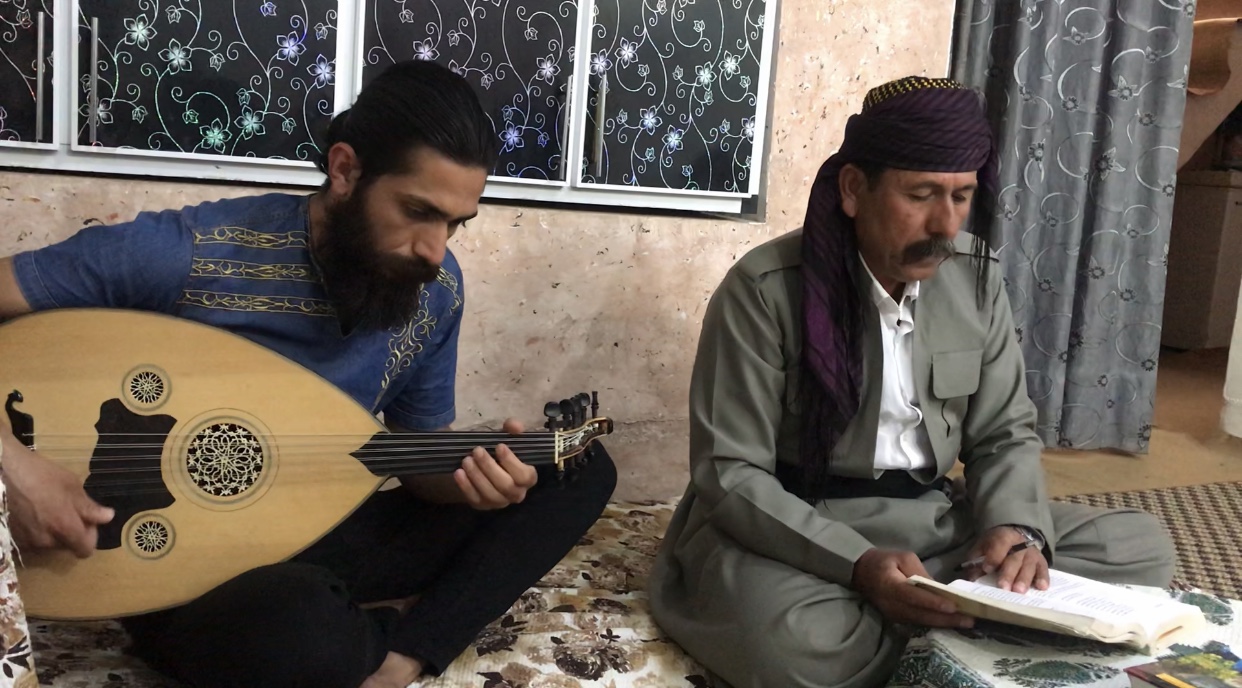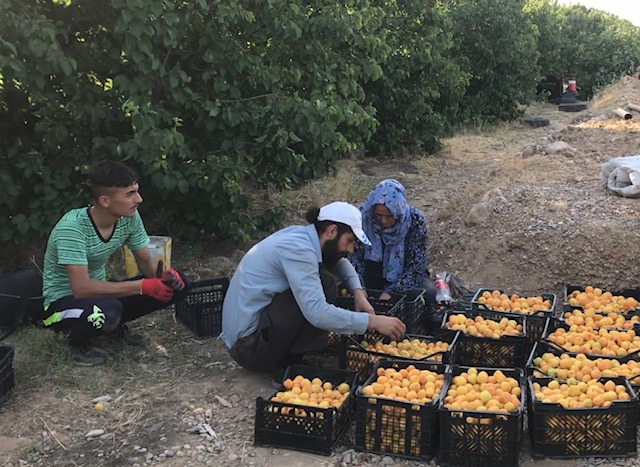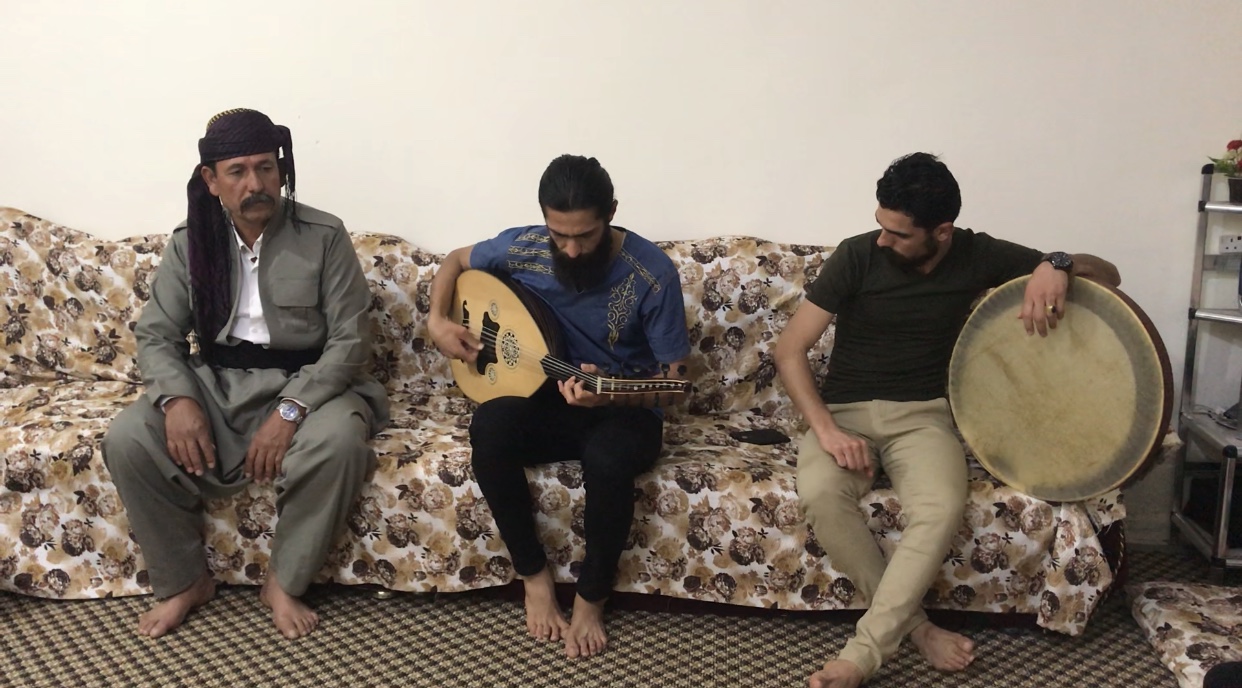At Bahman’s home, authentic traditional singing and reciting poetry are interfused with melodies from the lute and Daf (Kurdish frame drum). And his wife makes their home all the more cozier with her skillfully pastries.
Other families think that home confinement due to the Coronavirus is causing them psychologic distress, but not this Kakayi family.
Bahman’s family stress that whatever they might lose due to the pandemic, they will not allow themselves to lose their art skills. That is why since the pandemic has hit Iraq, they spend more time on their art.
63-year-old Bahman Wali, a Kakayi resident of Daquq, says that in this way they protect themselves from the Coronavirus, and at the same time hone their art skills. And besides those benefits, art helps them alleviate the stress they have due to losing their livelihood; their crops.
Bahman has a beautiful voice and is a skillful Maqam singer. One of his sons studies music and plays the Oud (a type of lute); another one of his sons is a Daf player, and the other is a Maqam singer like himself.
During the curfew, the family has spent most of their time honing their skills. “One should not neglect art and preservation of traditions.”

Since March, Kirkuk administration has issued numerous measures against the spread of the COVID-19, among them was a curfew. The latter came after four persons died of the virus in April.
The measure came hard for many families, but for Bahman (who is both a teacher and farmer) it was a chance to spend time with his family and develop their musical skills.
At the beginning, staying home was very unpleasant and unsettling
“At the beginning, staying home was very unpleasant and unsettling. I was saddened by the fact that a part of my crops and groves will die out: when the curfew was enforced, it was time to work the fields.” He added that when the curfew was prolonged, “we gave up on this year’s harvest, which made us very sad.”
When the family was compelled to stay home, they thought they should hone their art skills. “Art should not be neglected, it is food for the soul,” he said. Bahman and his sons have been practicing music several hours a day in that period.
“Sometime I would write poetry and recite it to my children, and then we would talk. Other times I would sing a Maqam. This has been good for our mental well-being, because the corona pandemic has had a bad effect on people’s psyche,” said Bahman, and added “and on top of the hardship of self-isolation, we also grieved the loss of our crops.”
Bahman’s agricultural fields lie about 10 kilometres from Daquq. It contains groves of apricots, figs, vines and pomegranates. Next to those, every year they would grow cucumber, tomato, courgette, okra, and watermelons. But this year their harvest was halved, says Bahman.
According to government numbers, 20 suicide cases have been registered during three months of curfew alone, and that most of the cases were due to unemployment and domestic violence.
Nawz, the eldest son of Bahman and an art student, told KirkukNow: “Before the spread of the Coronavirus, when I was coming home from college, I would go to the fields with my father and brothers and work there. The closure of school and the curfew made me jaded, but music and art made me forget my sorrows.”
My father would sing on a daily basis as I and my brothers would play the lute and the Daf, which would make us mentally at ease
My father would sing on a daily basis as I and my brothers would play the lute and the Daf, which would make mentally at eas. But I would often feel that my parents were suffering due to the loss of part of our groves, for which they had worked hard for years. But they wouldn’t talk about their pain.”
According to KirkukNow’s inquiries, there are 15 Kakayi villages in the Daquq area. The Kakayi are among the most affected by the pandemic, especially the farmers among them.

Bahman has three sons and a daughter. He praises his wife: “She would not let us be bored. We are now all healthy and in good mental state. We are ready to endure this situation.”
The Coronavirus and home confinement took part of our livelihood and isolated us from our relatives, but we didn’t give up and filled our home with art and love
“The Coronavirus and home confinement took part of our livelihood and distanced us from our relatives, but we didn’t give up and filled our home with art and love,” Barham said.
Bahman thinks that it is possible for families to take advantage of staying home, and he has found out that one of his sons has talent for playing the Daf, another for lute, and the other has an authentic voice for singing the Maqam, which he can develop.





